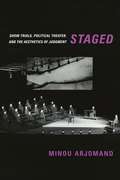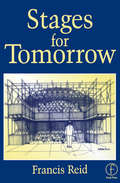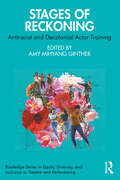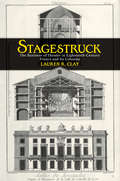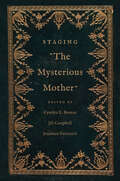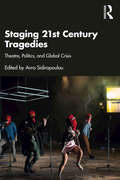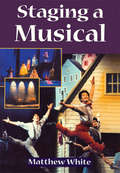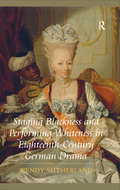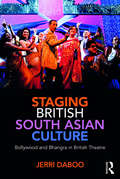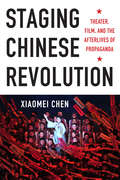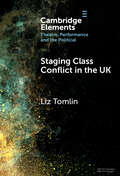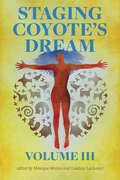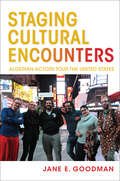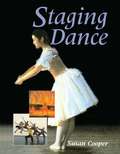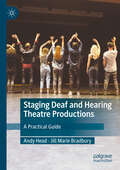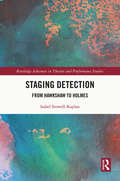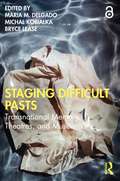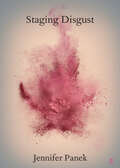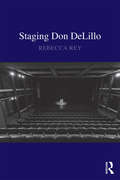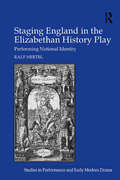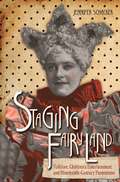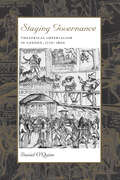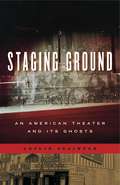- Table View
- List View
Staged: Show Trials, Political Theater, and the Aesthetics of Judgment
by Minou ArjomandTheater requires artifice, justice demands truth. Are these demands as irreconcilable as the pejorative term “show trials” suggests? After the Second World War, canonical directors and playwrights sought to claim a new public role for theater by restaging the era’s great trials as shows. The Nuremberg trials, the Eichmann trial, and the Auschwitz trials were all performed multiple times, first in courts and then in theaters. Does justice require both courtrooms and stages?In Staged, Minou Arjomand draws on a rich archive of postwar German and American rehearsals and performances to reveal how theater can become a place for forms of storytelling and judgment that are inadmissible in a court of law but indispensable for public life. She unveils the affinities between dramatists like Bertolt Brecht, Erwin Piscator, and Peter Weiss and philosophers such as Hannah Arendt and Walter Benjamin, showing how they responded to the rise of fascism with a new politics of performance. Linking performance with theories of aesthetics, history, and politics, Arjomand argues that it is not subject matter that makes theater political but rather the act of judging a performance in the company of others. Staged weaves together theater history and political philosophy into a powerful and timely case for the importance of theaters as public institutions.
Stages for Tomorrow: Housing, funding and marketing live performances
by Francis ReidThroughout the twentieth century, live theatre has been challenged by a range of new media based on increasingly sophisticated technologies. In Stages for Tomorrow, Francis Reid, one of the world's best known and best loved lighting designers, gives a unique insight into some of the key developments of live performance technology this century and offers a view of where the future lies - a must for any theatre professional who takes their job seriously. Throughout the twentieth century, live theatre has been challenged by a range of new media based on increasingly sophisticated technologies - audio recording, film, radio, television, video recording - and it has survived them all. Now live performance faces an information technology explosion where the reality is claimed to be virtual. In Stages for Tomorrow, Francis Reid, one of the world's best known and best loved lighting designers, gives a unique insight into some of the key developments of live performance technology this century and offers a view of where the future lies - a must for any theatre professional who takes their job seriously. The book covers every aspect of staging a live performance: from its relationship with photographic and digital media, old and new, to factors affecting the architectural design of buildings which house performances of ephemeral arts. The technology of staging styles is covered, with ongoing engineering solutions for scenery, light and sound. The book also examines developments in costume design, marketing and training. Whether student or seasoned professional - this is a guide to the technical theatre that you won't want to be without - now, or in the future!
Stages of Reality
by Jeremy Maron André LoiselleA groundbreaking collection of original essays, Stages of Reality establishes a new paradigm for understanding the relationship between stage and screen media. This comprehensive volume explores the significance of theatricality within critical discourse about cinema and television.Stages of Reality connects the theory and practice of cinematic theatricality through conceptual analyses and close readings of films including The Matrix and There Will be Blood. Contributors illuminate how this mode of address disrupts expectations surrounding cinematic form and content, evaluating strategies such as ostentatious performances, formal stagings, fragmentary montages, and methods of dialogue delivery and movement. Detailing connections between cinematic artifice and topics such as politics, gender, and genre, Stages of Reality allows readers to develop a clear sense of the multiple purposes and uses of theatricality in film.
Stages of Reckoning: Antiracist and Decolonial Actor Training (Routledge Series in Equity, Diversity, and Inclusion in Theatre and Performance)
by Amy Mihyang GintherStages of Reckoning is a crucial conversation about how racialized bodies and power intersect within actor training spaces. This book provokes embodied and intellectual discomfort for the reader to take risks with their ideologies, identities, and practices and to make new pedagogical choices for students with racialized identities. Centering the voices of actor trainers of color to acknowledge their personal experience and professional pedagogy as theory, this volume illuminates actionable ideas for text work, casting, voice, consent practices, and movement while offering decolonial approaches to current Eurocentric methods. These offerings invite the reader to create spaces where students can bring more of themselves, their communities, and their stories into their training and as fodder for performance making that will lead to a more just world. This book is for people in high/secondary schools, higher education, and private training studios who wish to teach and direct actors of color in ways that more fully honor their multiple identities.
Stagestruck: The Business of Theater in Eighteenth-Century France and Its Colonies
by Lauren R. ClayStagestruck traces the making of a vibrant French theater industry between the reign of Louis XIV and the French Revolution. During this era more than eighty provincial and colonial cities celebrated the inauguration of their first public playhouses. These theaters emerged as the most prominent urban cultural institutions in prerevolutionary France, becoming key sites for the articulation and contestation of social, political, and racial relationships. Combining rich description with nuanced analysis based on extensive archival evidence, Lauren R. Clay illuminates the wide-ranging consequences of theater's spectacular growth for performers, spectators, and authorities in cities throughout France as well as in the empire's most important Atlantic colony, Saint-Domingue.Clay argues that outside Paris the expansion of theater came about through local initiative, civic engagement, and entrepreneurial investment, rather than through actions or policies undertaken by the royal government and its agents. Reconstructing the business of theatrical production, she brings to light the efforts of a wide array of investors, entrepreneurs, directors, and actors-including women and people of color-who seized the opportunities offered by commercial theater to become important agents of cultural change.Portraying a vital and increasingly consumer-oriented public sphere beyond the capital, Stagestruck overturns the long-held notion that cultural change flowed from Paris and the royal court to the provinces and colonies. This deeply researched book will appeal to historians of Europe and the Atlantic world, particularly those interested in the social and political impact of the consumer revolution and the forging of national and imperial cultural networks. In addition to theater and literary scholars, it will attract the attention of historians and sociologists who study business, labor history, and the emergence of the modern French state.
Staging "The Mysterious Mother" (The Lewis Walpole Series in Eighteenth-Century Culture and History)
by Cynthia E. Roman, Jill Campbell, and Jonathan KramnickThe first book-length study of Horace Walpole&’s scandalous The Mysterious Mother, including critical essays, an abridged script, and a facsimile edition Horace Walpole&’s five-act tragedy The Mysterious Mother (1768), a sensational tale of incest and intrigue, was initially circulated only among the author&’s friends. Walpole never permitted it to be performed during his lifetime except as a private theatrical. He described his play as a &“delicious entertainment for the closet&” and claimed that he &“did not think it would do for the stage.&” Yet the essays in this volume trace a history of private readings, amateur theatricals, and even early public performances, demonstrating that the play was read and performed more than Walpole&’s protests suggest. Exploring a wide variety of topics—including the play&’s crypto-Catholicism, its treatments of incest, guilt, motherhood, orphans, and scientific spectacle, and the complex relations between print and performance—the essays demonstrate the rich relevance of The Mysterious Mother to current critical discussions. The volume includes the proceedings of a mini-conference hosted at Yale University in 2018 on the occasion of a staged reading of the play. Also included are the director&’s reflections, an abridged script, a facsimile of Walpole&’s own copy of the full-length play, and reproductions of the illustrations he commissioned from Lady Diana Beauclerk.
Staging 21st Century Tragedies: Theatre, Politics, and Global Crisis
by Avra SidiropoulouStaging 21st Century Tragedies: Theatre, Politics, and Global Crisis is an international collection of essays by leading academics, artists, writers, and curators examining ways in which the global tragedies of our century are being negotiated in current theatre practice. In exploring the tragic in the fields of history and theory of theatre, the book approaches crisis through an understanding of the existential and political aspect of the tragic condition. Using an interdisciplinary perspective, it showcases theatre texts and productions that enter the public sphere, manifesting notably participatory, immersive, and documentary modes of expression to form a theatre of modern tragedy. The coexistence of scholarly essays with manifesto-like provocations, interviews, original plays, and diaries by theatre artists provides a rich and multifocal lens that allows readers to approach twenty-first-century theatre through historical and critical study, text and performance analysis, and creative processes. Of special value is the global scope of the collection, embracing forms of crisis theatre in many geographically diverse regions of both the East and the West. Staging 21st Century Tragedies: Theatre, Politics, and Global Crisis will be of use and interest to academics and students of political theatre, applied theatre, theatre history, and theatre theory.
Staging A Musical: An Essential Guide (Stage And Costume Ser.)
by Matthew WhiteIn Staging a Musical, Matthew White describes all the elements involved in putting on a musical production, including: how to choose the right show, budgets and schedules, auditions, rehearsals, and performances.
Staging Blackness and Performing Whiteness in Eighteenth-Century German Drama (Ashgate New Critical Thinking In Religion, Theology And Biblical Studies)
by Wendy SutherlandFocusing on eighteenth-century cultural productions, Wendy Sutherland examines how representations of race in philosophy, anthropology, aesthetics, drama, and court painting influenced the construction of a white bourgeois German self. Sutherland positions her work within the framework of the transatlantic slave trade, showing that slavery, colonialism, and the triangular trade between Europe, West Africa, and the Caribbean function as the global stage on which German bourgeois dramas by Friedrich Wilhelm Ziegler, Ernst Lorenz Rathlef, and Theodor Körner (and a novella by Heinrich von Kleist on which Körner's play was based) were performed against a backdrop of philosophical and anthropological influences. Plays had an important role in educating the rising bourgeois class in morality, Sutherland argues, with fathers and daughters offered as exemplary moral figures in contrast to the depraved aristocracy. At the same time, black female protagonists in nontraditional dramas represent the boundaries of physical beauty and marriage eligibility while also complicating ideas of moral beauty embodied in the concept of the beautiful soul. Her book offers convincing evidence that the eighteenth-century German stage grappled with the representation of blackness during the Age of Goethe, even though the German states were neither colonial powers nor direct participants in the slave trade.
Staging British South Asian Culture: Bollywood and Bhangra in British Theatre
by Jerri DabooStaging British South Asian Culture: Bollywood and Bhangra in British Theatre looks afresh at the popularity of forms and aesthetics from Bollywood films and bhangra music and dance on the British stage. From Andrew Lloyd Webber’s Bombay Dreams to the finals of Britain’s Got Talent, Jerri Daboo reconsiders the centrality of Bollywood and bhangra to theatre made for or about British South Asian communities. Addressing rarely discussed theatre companies such as Rifco, and phenomena such as the emergence of large- scale Bollywood revue performances, this volume goes some way towards remedying the lack of critical discourse around British South Asian theatre. A timely contribution to this growing field, Staging British South Asian Culture is essential reading for any scholar or student interested in exploring the highly contested questions of identity and representation for British South Asian communities.
Staging Chinese Revolution: Theater, Film, and the Afterlives of Propaganda
by Xiaomei ChenStaging Chinese Revolution surveys fifty years of theatrical propaganda performances in China, revealing a dynamic, commercial capacity in works often dismissed as artifacts of censorship. Spanning the 1960s through the 2010s, Xiaomei Chen reads films, plays, operas, and television shows from an interdisciplinary and comparative perspective, demonstrating how, in a socialist state with "capitalist characteristics," propaganda performance turns biographies, memoirs, and war stories into mainstream ideological commodities, legitimizing the state and its right to rule. Analyzing propaganda performance also brings contradictions and inconsistencies to light that throw common understandings about propaganda's purpose into question.Chen focuses on revisionist histories that stage the lives of the "founding fathers" of the Communist Party, such as Chen Duxiu, Mao Zedong, and Deng Xiaoping, and the engaging mix of elite and ordinary characters that animate official propaganda in the private and public sphere. Taking the form of "personal" memories and representing star and youth culture and cyberspace, contemporary Chinese propaganda appeals through multiple perspectives, complicating relations among self, subject, agent, state building, and national identity. Chen treats Chinese performance as an extended form of political theater confronting critical issues of commemoration, nostalgia, state rituals, and contested history. It is through these reenactments that three generations of revolutionary leaders loom in extraordinary ways over Chinese politics and culture.
Staging Class Conflict in the UK (Elements in Theatre, Performance and the Political)
by Liz TomlinThis Element focuses on the frequent staging of the most precarious fraction of the working class in the context of a theatre industry, academy and audiences that are dominated by the cultural fraction of the middle class. It interrogates the staging of an abjectified figure as a means of challenging the stigmatisation of the poor in political discourse, defined here as an ideological imaginary of moral and cultural deficit. The Element argues that in seeking to subvert such an imaginary, theatre that stages the abjectified subject may risk consolidating two further imaginaries of working class deficit that have been confected in political discourse from the 1990s to the 2020s. In conclusion, the Element reflects on the political potential of theatre that rather seeks to eradicate class descriptors, conflicts and hierarchies altogether. This title is also available as Open Access on Cambridge Core.
Staging Conventions in Medieval English Theatre
by Philip ButterworthHow was medieval English theatre performed? Many of the modern theatrical concepts and terms used today to discuss the nature of medieval English theatre were never used in medieval times. Concepts and terms such as character, characterisation, truth and belief, costume, acting style, amateur, professional, stage directions, effects and special effects are all examples of post-medieval terms that have been applied to the English theatre. Little has been written about staging conventions in the performance of medieval English theatre and the identity and value of these conventions has often been overlooked. In this book, Philip Butterworth analyses dormant evidence of theatrical processes such as casting, doubling of parts, rehearsing, memorising, cueing, entering, exiting, playing, expounding, prompting, delivering effects, timing, hearing, seeing and responding. All these concerns point to a very different kind of theatre to the naturalistic theatre produced today.
Staging Coyote's Dream Volume 3
by Monique Mojica and Lindsay LachanceOn the twentieth anniversary of its first volume, Staging Coyote’s Dream Volume III is a curated collection of new works rooted in Indigenous values, aesthetics, and narrative structures. Inspired by their own dramaturgical practices and current conversations in contemporary theatre creation, co-editors Monique Mojica and Lindsay Lachance identify the invaluable and understudied ways that many Indigenous theatre artists are creating culturally specific dramaturgical processes and shifting the paradigm for what is considered “text.” By presenting models for relational theatre-making and land-based explorations outside the traditional “well-made-play” structure, Staging Coyote’s Dream Volume III is more than just a collection of plays; it offers strategies and tools for how Indigenous artists can reimagine the structures of new-play development and performance on Turtle Island.An anthology that identifies and highlights a vast array of anti-colonial performing arts processes, including reclamation, embodiment, and community-engaged work—to name only a few—Mojica and Lachance gather the works of artists leading these practices to not only honour how their plays are expanding dramaturgy, but to build Indigenous performance literacies for all practitioners creating on Turtle Island.
Staging Cultural Encounters: Algerian Actors Tour the United States (Public Cultures of the Middle East and North Africa)
by Jane E. GoodmanAn anthropologist recounts an Algerian theater troupe’s 2016 US tour, detailing the highs and lows of the cross-cultural exchange.Staging Cultural Encounters tells stories about performances of cultural encounter and cultural exchange during the US tour of the Algerian theater troupe Istijmam Culturelle in 2016. Jane E. Goodman follows the Algerian theater troupe as they prepare for and then tour the United States under the auspices of the Center Stage program, sponsored by the US State Department to promote cross-cultural dialogue and understanding.The title of the play Istijmam produced was translated as “Apples,” written by Abdelkader Alloula, a renowned Algerian playwright, director, and actor who was assassinated in 1994. Goodman take readers on tour with the actors as they move from the Kennedy Center in Washington, D.C. to the large state universities of New Hampshire and Indiana, and from a tiny community theater in small-town New England to the stage of the avant-garde La MaMa Theater in New York City.Staging Cultural Encounters takes up conundrums of cross-cultural encounter, challenges in translation, and audience reception, offering a frank account of the encounters with American audiences and the successes and disappointments of the experience of exchange.“This is a ground-breaking and beautifully written work in the anthropology of performance as well as an intervention in experimental anthropology, wherein theater play is both ethnographic subject and method. The book is accompanied by a detailed website of audio-visual examples, making this a hyper-text, a multi-modal way of knowing. It is a tour de force.” —Deborah Kapchan, author of Theorizing Sound Writing“In this engrossing ethnography [Goodman] brings to life the excitements, hopes and disappointments of their staged cultural encounter. We are shown in fascinating detail what lies behind and before the tour: the actors’ intense disciplined dedication to avant garde theatre practices, the political and economic constraints of contemporary Algeria, the labour of translation, the performance traditions of the Algerian market place. . . . Subtle, searching and empathetic, with touches of wry humor, Goodman’s study will become an instant classic in anthropology, theatre and performance studies.” —Karin Barber, London School of Economics, author of A History of African Popular Culture
Staging Dance (Ballet, Dance, Opera And Music Ser.)
by Susan CooperStaging Dance is a practical handbook that covers all aspects of putting on a dance production. It highlights the current diversity of dance activities, choosing examples from working dance groups and from individual dancers.The book includes sections on choreography, music and sound, designing and making sets and costumes, lighting design and technical implementation and stage management. Funding, planning and publicity are also covered.Staging Dance will prove invaluable not only to dance artists, but also those working along side them: musicians, designers, lighting technicians, administrators and directors.
Staging Deaf and Hearing Theatre Productions: A Practical Guide
by Andy Head Jill Marie BradburyThis book explores an unacknowledged gap in theatre study and praxis, and establishes an inceptive model for transforming a playscript into a theatrical production involving deaf and hearing artists. The book stipulates that theatrical productions of this nature should strive to go beyond accessibility towards inclusivity by considering deaf perspectives at every stage of the process: When deaf actors are cast in roles assumed to be hearing, how does this change the world of the play? How does the inclusion of a visual language affect staging decisions? How can truly equal access to two different language modalities be achieved for diverse production teams and audiences? Because deaf artists should be involved in the leadership and creative decision making throughout the process, this book is co-written by a deaf and hearing team. The main topics of the book include pre-production preparation, the rehearsal process, and performance. As deaf theatre artists move increasingly into the foreground, it’s time for the hearing theatre world to learn how to undertake productions that successfully bridge the deaf and hearing worlds. By including the perspective of directors, actors, designers, and audience members, this guide lays out an ideal process towards achieving that goal.
Staging Detection: From Hawkshaw to Holmes (Routledge Advances in Theatre & Performance Studies)
by Isabel Stowell-KaplanStaging Detection reveals how the new figure of the stage detective emerged in nineteenth-century Britain. The first book to explore the productive intersections between detection and performance across a range of Victorian plays, Staging Detection foregrounds the role of the stage detective in shaping important theatrical modes of the period, from popular melodrama to society comedy. Beginning in 1863 with Tom Taylor’s blockbuster play, The Ticket-of-Leave Man, the book criss-crosses London following the earliest performances of stage detectives. Centring the work of playwrights, novelists, critics and actors, from Sarah Lane and Horace Wigan to Wilkie Collins and Oscar Wilde, Staging Detection sheds new light on Victorian acting styles, furthers our understanding of melodrama, and resituates the famous Wildean dandy as a successor to the stage detective. Drawing on histories of masculinity and gender performance as well as developing scientific theory and nineteenth-century visual culture, Staging Detection shows how the earliest stage portrayals of the detective shaped broader Victorian debates concerning fraud, omniscience and earned authority. This book will be of great interest to students and scholars of theatre history, Victorian literature and popular culture – as well as anyone with an interest in the figure of the detective.
Staging Difficult Pasts: Transnational Memory, Theatres, and Museums
by Michal Kobialka Maria M. Delgado Bryce LeaseThis collection of original essays brings together museum, theatre, and performance case studies with a focus on their distinctive and overlapping modes of producing memory for transnational audiences. Whether this is through narrative, object, embodied encounter or a combination of the three, this volume considers distinctions and interactions between memory and history specifically through the lenses of theatre and performance studies, visual culture, and museum and curator studies. This book is underpinned by three areas of research enquiry: How are contemporary theatre makers and museum curators staging historical narratives of difficult pasts? How might comparisons between theatre and museum practices offer new insights into the role objects play in generating and representing difficult pasts? What points of overlap, comparison, and contrast among these constructions of history and memory of authoritarianism, slavery, colonialism, genocide, armed conflict, fascism, and communism might offer an expanded understanding of difficult pasts in these transnational cultural contexts? This collection is designed for any scholar of its central disciplines, as well as for those interested in cultural geography, memory studies, and postcolonial theory. The Open Access version of this book, available at http://www.taylorfrancis.com, has been made available under a Creative Commons Attribution-NoDerivatives (CC-BY-ND) 4.0 license.
Staging Disgust: Rape, Shame, and Performance in Shakespeare and Middleton (Elements in Shakespeare Performance)
by Jennifer PanekThis Element turns to the stage to ask a simple question about gender and affect: what causes the shame of the early modern rape victim? Beneath honour codes and problematic assumptions about consent, the answer lies in affect, disgust. It explores both the textual "performance" of affect, how literary language works to evoke emotions and the ways disgust can work in theatrical performance. Here Shakespeare's poem The Rape of Lucrece is the classic paradigm of sexual pollution and shame, where disgust's irrational logic of contamination leaves the raped wife in a permanent state of uncleanness that spreads from body to soul. Staging Disgust offers alternatives to this depressing trajectory: Middleton's Women Beware Women and Shakespeare's Titus Andronicus perform disgust with a difference, deploying the audience's revulsion to challenge the assumption that a raped woman should “naturally” feel intolerable shame.
Staging Don DeLillo
by Rebecca ReyThe first book-length study to focus on Don DeLillo's plays, Staging Don DeLillo brings the author's theatre works to the forefront. Rebecca Rey explores four central themes that emerge across DeLillo's theatre oeuvre: the centrality of language; the human fear of death; the elusiveness of truth; and the deceptive, slippery nature of personal identity. Rey examines all seven of DeLillo's plays chronologically: "The Engineer of Moonlight" (1979), The Day Room (1986), the one-minute plays "The Rapture of the Athlete Assumed Into Heaven" (1990), and "The Mystery at the Middle of Ordinary Life" (2000), Valparaiso (1999), Love-Lies-Bleeding (2006), and The Word for Snow (2014). Written in clear, accessible language, and interweaving critique of DeLillo's novels throughout, this book will appeal not only to DeLillo scholars but also to anyone working on contemporary literature and drama.
Staging England in the Elizabethan History Play: Performing National Identity (Studies In Performance And Early Modern Drama Ser.)
by Ralf HertelApplying current political theory on nationhood as well as methods established by recent performance studies, this study sheds new light on the role the public theatre played in the rise of English national identity around 1600. It situates selected history plays by Shakespeare and Marlowe in the context of non-fictional texts (such as historiographies, chorographies, political treatises, or dictionary entries) and cultural artefacts (such as maps or portraits), and thus highlights the circulation, and mutation, of national thought in late sixteenth-century culture. At the same time, it goes beyond a New Historicist approach by foregrounding the performative surplus of the theatre event that is so essential for the shaping of collective identity. How, this study crucially asks, does the performative art of theatre contribute to the dynamics of the formation of national identity? Although theories about the nature of nationalism vary, a majority of theorists agree that notions of a shared territory and history, as well as questions of religion, class and gender play crucial roles in the shaping of national identity. These factors inform the structure of this book, and each is examined individually. In contrast to existing publications, this inquiry does not take for granted a pre-existing national identity that simply manifested itself in the literary works of the period; nor does it proceed from preconceived notions of the playwrights’ political views. Instead, it understands the early modern stage as an essentially contested space in which conflicting political positions are played off against each other, and it inquires into how the imaginative work of negotiating these stances eventually contributed to a rising national self-awareness in the spectators.
Staging Fairyland: Folklore, Children's Entertainment, and Nineteenth-Century Pantomime (Series in Fairy-Tale Studies)
by Jennifer SchackerIn nineteenth-century Britain, the spectacular and highly profitable theatrical form known as "pantomime" was part of a shared cultural repertoire and a significant medium for the transmission of stories. Rowdy, comedic, and slightly risqué, pantomime productions were situated in dynamic relationship with various forms of print and material culture. Popular fairy-tale theater also informed the production and reception of folklore research in ways that are often overlooked. In Staging Fairyland: Folklore, Children’s Entertainment, and Nineteenth-Century Pantomime, Jennifer Schacker reclaims the place of theatrical performance in this history, developing a model for the intermedial and cross-disciplinary study of narrative cultures. The case studies that punctuate each chapter move between the realms of print and performance, scholarship and popular culture. Schacker examines pantomime productions of such well-known tales as "Cinderella," "Little Red Riding Hood," and "Jack and the Beanstalk," as well as others whose popularity has waned—such as, "Daniel O’Rourke" and "The Yellow Dwarf." These productions resonate with traditions of impersonation, cross-dressing, literary imposture, masquerade, and the social practice of "fancy dress." Schacker also traces the complex histories of Mother Goose and Mother Bunch, who were often cast as the embodiments of both tale-telling and stage magic and who move through various genres of narrative and forms of print culture. These examinations push at the limits of prevailing approaches to the fairy tale across media. They also demonstrate the degree to which perspectives on the fairy tale as children's entertainment often obscure the complex histories and ideological underpinnings of specific tales. Mapping the histories of tales requires a fundamental reconfiguration of our thinking about early folklore study and about "fairy tales": their bearing on questions of genre and ideology but also their signifying possibilities—past, present, and future. Readers interested in folklore, fairy-tale studies, children’s literature, and performance studies will embrace this informative monograph.
Staging Governance: Theatrical Imperialism in London, 1770–1800
by Daniel O'QuinnBetween 1770 and 1800, transformations in the relationship between metropolitan British society and its colonial holdings, and in the concept of the nation itself, left Britons with a new sense of themselves. Over the same period, the consolidation of the middle classes was accompanied by growing social constraints on sexuality and family life. Staging Governance locates the intersection of these two trends in the representation of British India on the London stage. Theatrical productions, especially those representing colonial life, pushed the limits of public discourse on sexuality and colonialism even as the government made efforts to shape and narrow them. At the same time, official discourse on colonial practices, such as the public trials of Clive and Hastings, became theatrical events themselves. Exploring this rapidly shifting world through a series of original readings of dramatic texts and important moments of oratory, Staging Governance demonstrates how the perceived crises of imperial and domestic Britain joined these spheres in the popular imagination. The economics of political and sexual exchange not only became entwined but functioned as mutual supports during a period of social, cultural, and political readjustment.
Staging Ground: An American Theater and Its Ghosts (Keystone Books)
by Leslie StaintonIn this poignant and personal history of one of America’s oldest theaters, Leslie Stainton captures the story not just of an extraordinary building but of a nation’s tumultuous struggle to invent itself. Built in 1852 and in use ever since, the Fulton Theatre in Lancaster, Pennsylvania, is uniquely ghosted. Its foundations were once the walls of a colonial jail that in 1763 witnessed the massacre of the last surviving Conestoga Indians. Those same walls later served to incarcerate fugitive slaves. Staging Ground explores these tragic events and their enduring resonance in a building that later became a town hall, theater, and movie house—the site of minstrel shows, productions of Uncle Tom’s Cabin, oratory by the likes of Thaddeus Stevens and Mark Twain, performances by Buffalo Bill and his troupe of “Wild Indians,” Hollywood Westerns, and twenty-first-century musicals. Interweaving past and present, private anecdote and public record, Stainton unfolds the story of this emblematic space, where for more than 250 years Americans scripted and rescripted their history. Staging Ground sheds light on issues that continue to form us as a people: the evolution of American culture and faith, the immigrant experience, the growth of cities, the emergence of women in art and society, the spread of advertising, the flowering of transportation and technology, and the abiding paradox of a nation founded on the principle of equality for “all men,” yet engaged in the slave trade and in the systematic oppression of the American Indian.
